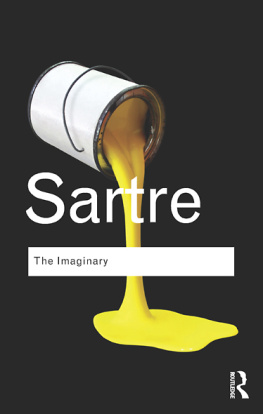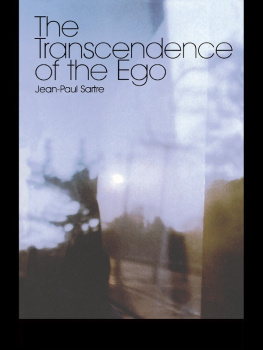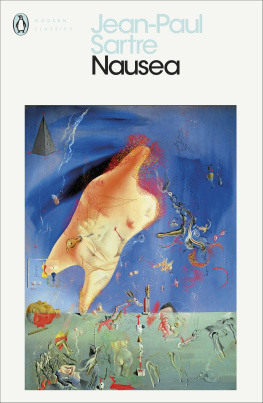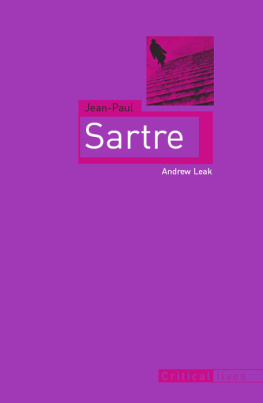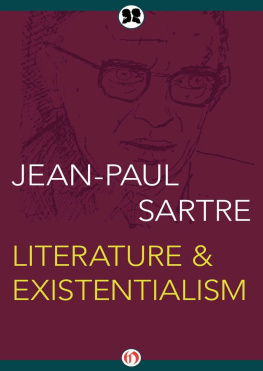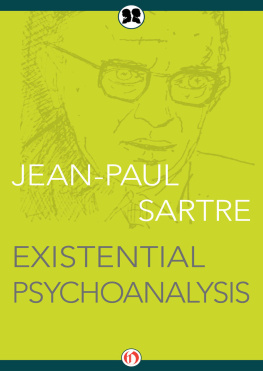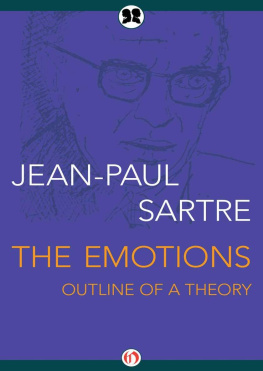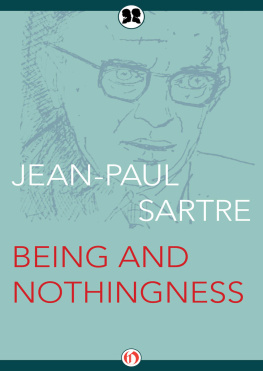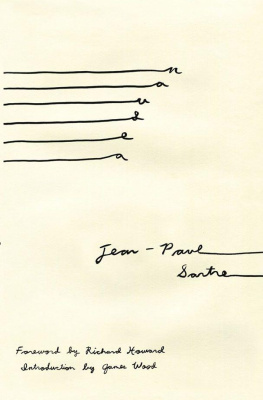Sartre - Jean-Paul Sartre: Basic Writings
Here you can read online Sartre - Jean-Paul Sartre: Basic Writings full text of the book (entire story) in english for free. Download pdf and epub, get meaning, cover and reviews about this ebook. year: 2002, publisher: Taylor and Francis, genre: Science. Description of the work, (preface) as well as reviews are available. Best literature library LitArk.com created for fans of good reading and offers a wide selection of genres:
Romance novel
Science fiction
Adventure
Detective
Science
History
Home and family
Prose
Art
Politics
Computer
Non-fiction
Religion
Business
Children
Humor
Choose a favorite category and find really read worthwhile books. Enjoy immersion in the world of imagination, feel the emotions of the characters or learn something new for yourself, make an fascinating discovery.
Jean-Paul Sartre: Basic Writings: summary, description and annotation
We offer to read an annotation, description, summary or preface (depends on what the author of the book "Jean-Paul Sartre: Basic Writings" wrote himself). If you haven't found the necessary information about the book — write in the comments, we will try to find it.
Jean-Paul Sartre: Basic Writings — read online for free the complete book (whole text) full work
Below is the text of the book, divided by pages. System saving the place of the last page read, allows you to conveniently read the book "Jean-Paul Sartre: Basic Writings" online for free, without having to search again every time where you left off. Put a bookmark, and you can go to the page where you finished reading at any time.
Font size:
Interval:
Bookmark:
This immensely useful volume makes it possible for readers to get a substantial and comprehensive knowledge of Sartrean philosophy. It is a remarkable achievement.
Hazel E. Barnes, University of Colorado at Boulder
this is a worthwhile and illuminating book.
Baroness Mary Warnock
brings together just the right texts, ordered in the right way, to draw the student into Sartre.
John J. Compton, Emeritus Professor of Philosophy, Vanderbilt University
Stephen Priests succinct, analytical introductions are invaluable a wideranging collection of extracts.
Christina Howells, Wadham College, Oxford
Jean-Paul Sartre is one of the most famous philosophers of the twentieth century. The principal founder of existentialism, a political thinker and famous novelist and dramatist, his work has exerted enormous influence in philosophy, literature, politics and cultural studies. Jean-Paul Sartre: Basic Writings is the first collection of Sartres key philosophical writings and provides an indispensable resource for all students and readers of his work. Stephen Priests clear and helpful introductions set each reading in context, making the volume an ideal companion for those coming to Sartres writings for the first time.
A key feature of the anthology is that it includes the full text of Sartres famous Existentialism and Humanism.
The selections are from:
Existentialism and Humanism
Being and Nothingness
Transcendence of the Ego
The Psychology of Imagination
What is Literature?
Search for a Method
Notebooks for an Ethics
The Family Idiot
Critique of Dialectical Reason
Stephen Priest is Reader in Philosophy at the University of Edinburgh and a Visiting Scholar of Wolfson College, Oxford. He is the author of The British Empiricists, Theories of the Mind, Merleau-Ponty and The Subject in Question and also editor of Hegels Critique of Kant.
First published 2001
by Routledge
2 Park Square, Milton Park, Abingdon Oxon, OX14 4RN
Simultaneously published in the USA and Canada
by Routledge
270 Madison Avenue, New York, NY 10016
Reprinted 2002, 2003, 2005 (twice)
Transferred to Digital Printing 2005
Routledge is an imprint of the Taylor & Francis Group
2001 Stephen Priest
Typeset in Times by
BOOK NOW Ltd
All rights reserved. No part of this book may be reprinted or reproduced or utilised in any form or by any electronic, mechanical, or other means, now known or hereafter invented, including photocopying and recording, or in any information storage or retrieval system, without permission in writing from the publishers.
British Library Cataloguing in Publication Data
A catalogue record for this book is available from the British Library
Library of Congress Cataloging in Publication Data
Sartre, Jean-Paul, 190580
[Selections. English, 2000]
Jean-Paul Sartre : basic writings / [edited by] Stephen Priest,
p. cm.
Includes bibliographical references.
1. Existentialism. I. Priest, Stephen. II. Title.
B2430.S31 P75 2000
| 194dc21 | 00-056017 |
ISBN 0-415-21367-3 (hbk)
ISBN 0-415-21368-1 (pbk)
The editor and the publishers wish to thank the following for permission to use copyright material:
Jean-Paul Sartre, Existentialism and Humanism; translation and introduction by Philip Mairet. First published in Great Britain in 1948 by Methuen, now Methuen Publishing Limited, 215 Vauxhall Bridge Road, London SW1V 1EJ. All rights reserved.
Jean-Paul Sartre, Esquisse dune thorie des motions (Sketch for a theory of the emotions). Copyright 1939. Paris, Hermann.
Jean-Paul Sartre, Being and Nothingness; translated and with an introduction by Hazel E. Barnes, 1956. Used by permission of the Philosophical Library, New York and International Thomson Publishing Services.
The Cogito As Reflective Consciousness from the I and the Me from Transcendence of the Ego: an Existentialist Theory of Consciousness by Jean-Paul Sartre, translated and annotated with an introduction by Forrest Williams and Robert Kirkpatrick. Copyright 1960, The Noonday Press, Inc., New York. Reprinted by permission of Farrar, Straus and Giroux, LLC.
Jean-Paul Sartre, The Psychology of Imagination. Copyright 1948. Reprinted by permission of Philosophical Library Inc. and International Thomson Publishing Services.
Jean-Paul Sartre, What is Literature?; translated from French by Bernard Frechtman. Copyright 1950, Methuen. Used by permission of the Philosophical Library, New York and International Thomson Publishing Services.
Jean-Paul Sartre, Search for a Method (New York: Vintage Books, 1963). Originally published in French as Questions de Mthode in Critique de la Raison Dialectique, Vol. 1. Copyright 1960 by Editions Gallimard. Reprinted by permission of Georges Borchardt, Inc. and by permission of Alfred A. Knopf, a Division of Random House, Inc.
Jean-Paul Sartre, Notebooks for an Ethics; translated by David Pellauer. Reprinted by permission of The University of Chicago Press.
Gustave Flaubert, The Family Idiot. Reprinted by permission of The University of Chicago Press.
Jean-Paul Sartre, Critique of Dialectical Reason, Vol. 1: Theory of Practical Ensembles, translated by Alan Sheridan Smith. London: Verso, 1991.
Every effort has been made to trace all the copyright holders, but if any have been inadvertently overlooked the publishers will be pleased to make the necessary arrangement at the first opportunity.
Stephen Priest
Jean-Paul Sartre (190580) is one of the greatest French thinkers. A polemical and witty essayist, a metaphysician of subjectivity, a political activist, a revolutionary political theorist, a humanistic novelist, a didactic playwright, his genius lies in his powers of philosophical synthesis and the genre-breaching breadth of his imagination.
In the 1970s, the French journalist Michel Rybalka delivered a lecture on Sartre which divided his intellectual development into three stages: liberty, equality and fraternity. The three concepts of the slogan of the French revolutionaries of 1789 were used to denote three kinds of philosophy which Sartre endorsed: existentialism, from the mid-1930s, Marxism, increasingly from the Second World War, and anarchism, in the last few years before he died in 1980.
Rybalkas threefold taxonomy is too neat, too clean and, however appealing, it is an over simplification. The adult Sartre was always an existentialist, a practitioner of that style of philosophising which addresses the fundamental problems of human existence: death, anxiety, political, religious and sexual commitment, freedom and responsibility, the meaning of existence itself. It follows that Sartre remained an existentialist during his long Marxist phase and during his final overtly anarchist phase.
Sartres existentialism was never a pure existentialism. One of his outstanding philosophical syntheses is the fusing of existentialism with phenomenology. The Moravian, German-speaking philosopher Edmund Husserl (18591938) and his Austrian teacher, the psychologist and philosopher Franz Brentano (18381917), are the founders of phenomenology. Phenomenology is the attempt to explain the possibility of all knowledge, including philosophy, by describing the content and structure of consciousness. It was Husserls hope that this partly Cartesian and partly Kantian project would place all knowledge on indubitable and incorrigible foundations. Husserlian phenomenology is Cartesian because it shares with Descartes the ambition of methodically exposing preconceptions and grounding knowledge in certainty. It is Kantian because it shares with the German idealist philosopher Immanuel Kant (17241804) the transcendental ambition of showing how all knowledge is possible (notably in his
Font size:
Interval:
Bookmark:
Similar books «Jean-Paul Sartre: Basic Writings»
Look at similar books to Jean-Paul Sartre: Basic Writings. We have selected literature similar in name and meaning in the hope of providing readers with more options to find new, interesting, not yet read works.
Discussion, reviews of the book Jean-Paul Sartre: Basic Writings and just readers' own opinions. Leave your comments, write what you think about the work, its meaning or the main characters. Specify what exactly you liked and what you didn't like, and why you think so.



